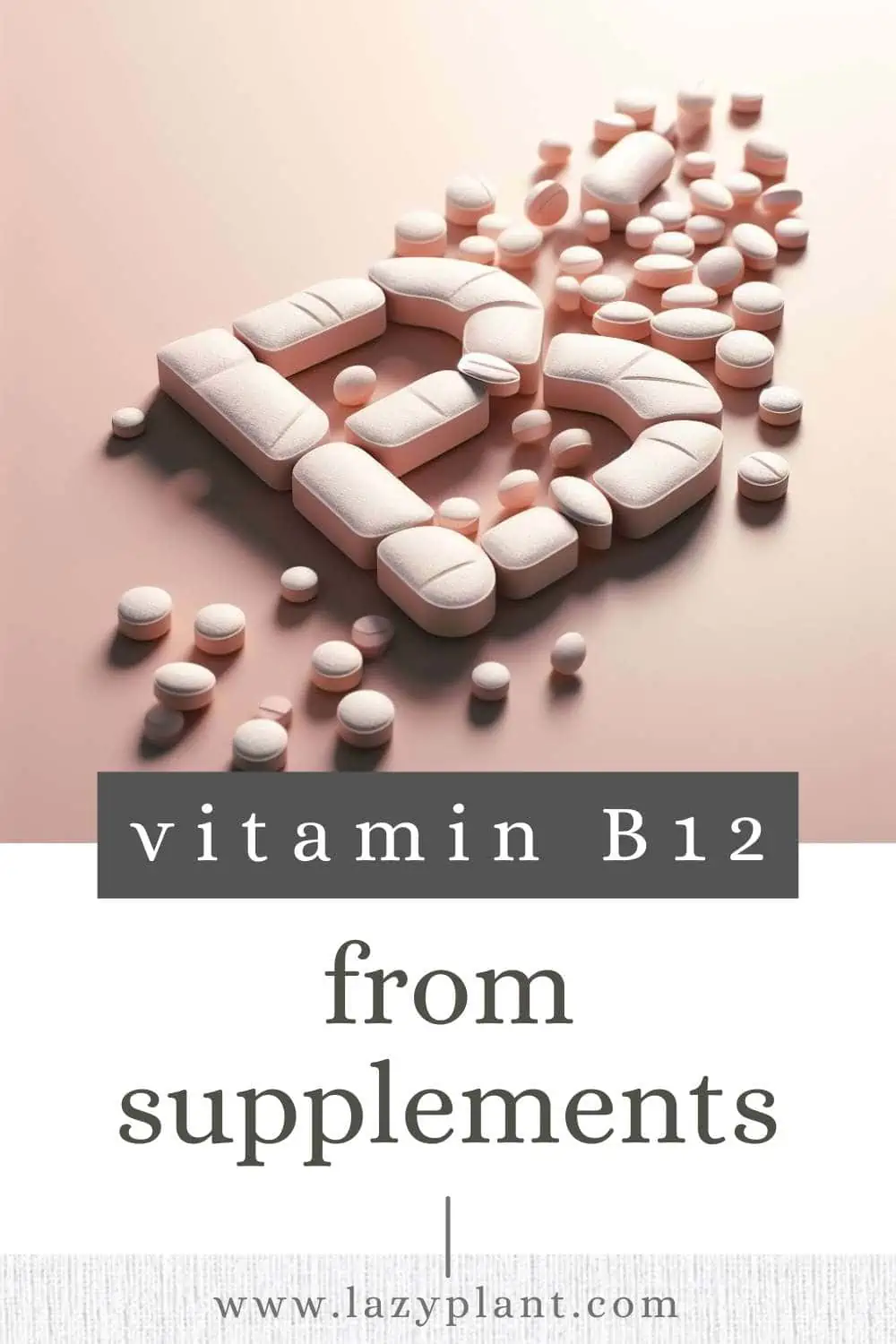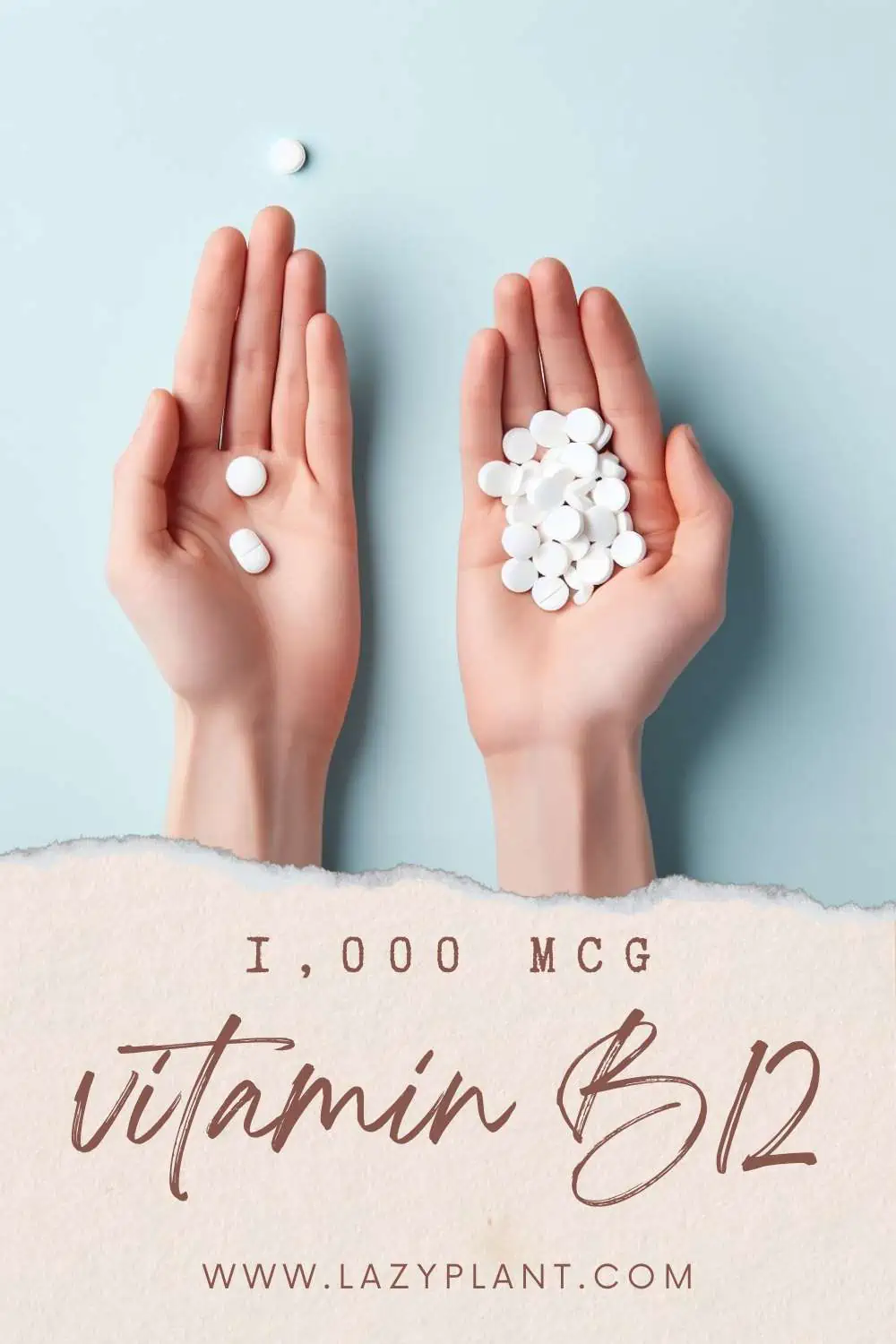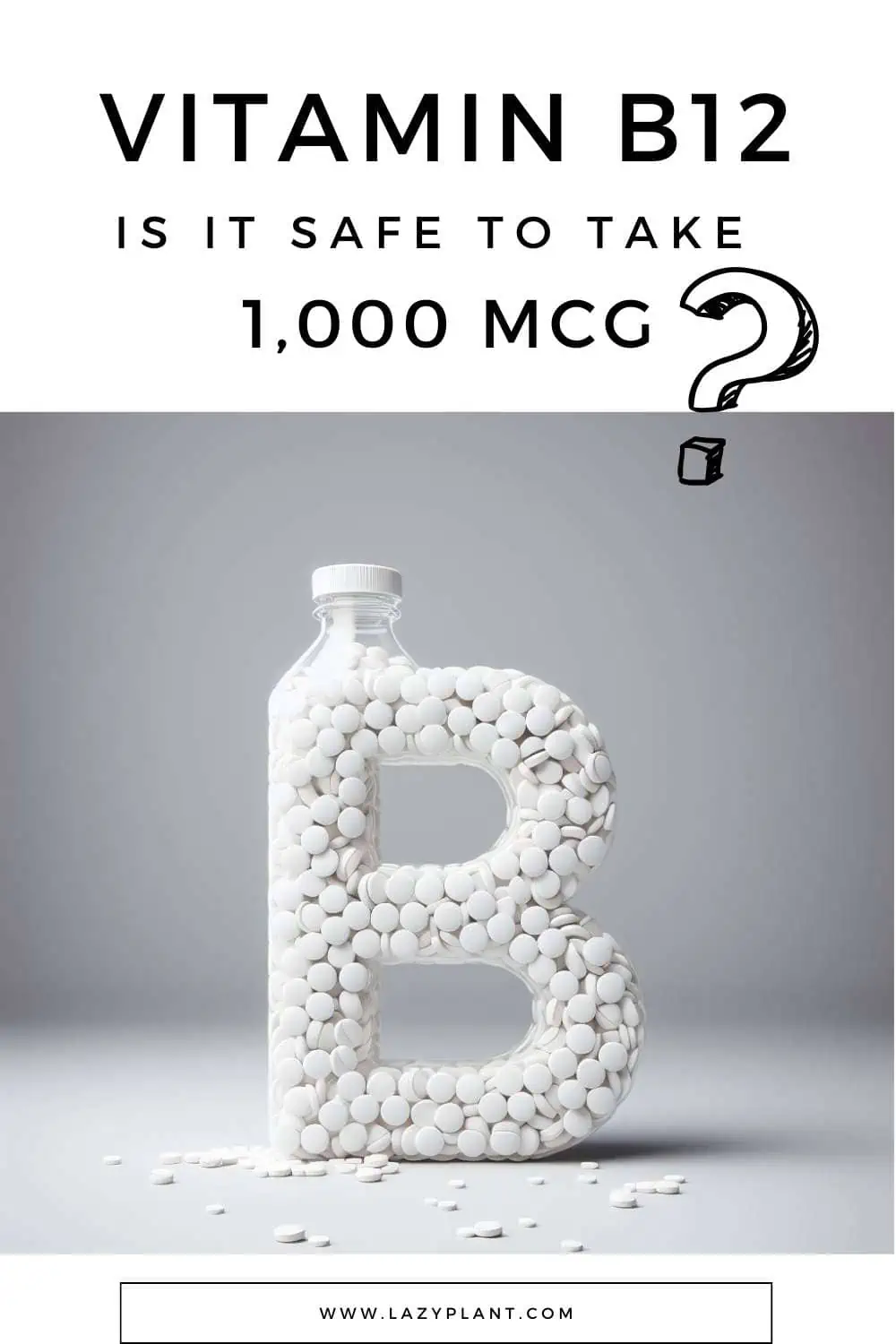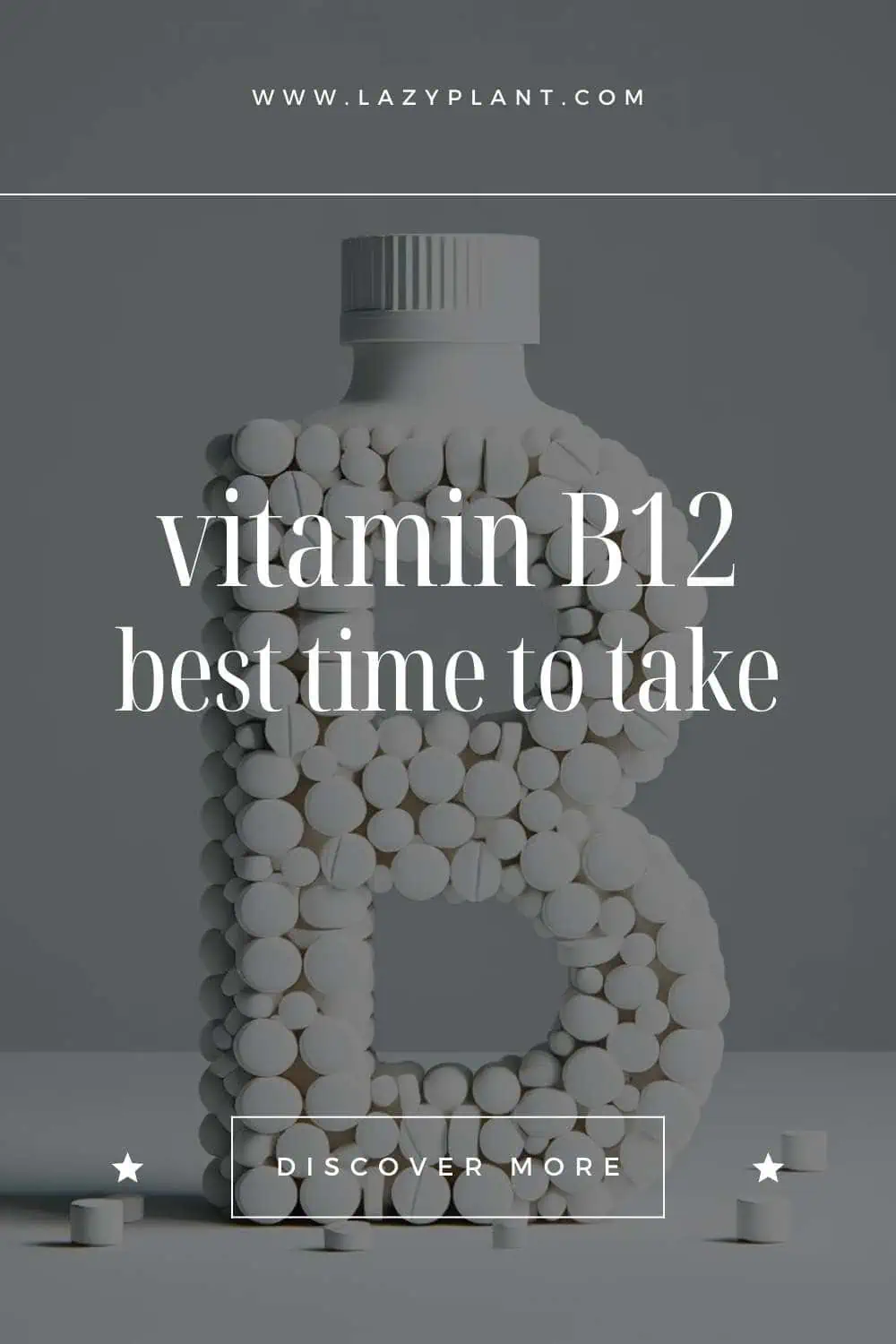Vitamin B12 is unlikely to be toxic, even in high daily dosages of 1,000 mcg. However, only people with severe vitamin B12 deficiency may benefit from much higher doses of 5,000 mcg.
How much Vitamin B12 should I take daily?
The recommended daily intake of vitamin B12 is only 2.4 mcg for most adults. Pregnant and lactating women need 2.6 mcg and 2.8 mcg of vitamin B12 a day, respectively.
Most people in the United States consume adequate amounts of vitamin B12. Average daily intakes of vitamin B12 from diet are close to 6 mcg for adult men and 3.8 mcg for women.
Is Vitamin B12 Deficiency Common?
But, approximately 6% of adults younger than 60 years are deficient in vitamin B12 in the United States.
However, the symptoms of vitamin B12 deficiency can take several years to appear, as the body stores about 1,000 to 5,000 mcg of vitamin B12, which is up to 2,000 times as much as the amount typically consumed in a day!
Seniors
The rate is closer to 20% in people older than 60 years, though. Hence, vitamin B12 deficiency is pretty common in seniors.
Certain health issues in older people also play a crucial role in vitamin B12 status, as they inhibit its absorption rates.
People with health issues
Individuals with stomach and small intestine disorders, such as celiac disease and Crohn’s disease, or individuals with pernicious anemia have also increased risk of vitamin B12 deficiency.

Vegetarians
Vegans, vegetarians, or people who rarely consume meat have also a higher risk of vitamin B12 deficiency.
That’s because animal-based foods are the only dietary sources of vitamin B12. We get vitamin B12 mainly from milk or other dairy products, meat, chicken, fish, and eggs.
Plant-based foods are poor dietary sources of vitamin B12. Only a few vegan foods contain some vitamin B12.
Neither plants nor animals produce vitamin B12. Only some soil bacteria synthesize it. When people used to drink water directly from lakes, wells, or streams, there wasn’t such thing as vitamin B12 deficiency!
Most noteworthy, exclusively breastfed infants of vegan women can develop vitamin B12 deficiency. Mothers who don’t eat meat and all people who follow a plant-based diet should be very cautious about taking vitamin B12 supplementation after consulting a healthcare provider.
Athletes
Active people, athletes and fitness enthusiasts should be very mindful of their vitamin B12 concentrations as well. Low levels may cause serious adverse effects, including fatigue, muscle weakness, pain, or cramps! It plays a crucial role both in muscle gain and endurance performance.
Vitamin B12 deficiency is bad for muscle growth
Athletes in bodybuilding should be very cautious with vitamin B12 intakes. They have to maintain normal vitamin B12 levels for muscle growth and recovery.
Firstly, vitamin B12 deficiency may cause muscle pain. In fact, vitamin B12 has been used to treat pain for years. In some countries, vitamin B12 is still used as an analgesic drug. It has neuroprotective and analgesic properties. Indeed, vitamin B12 may reduce or eliminate pain. Especially if it’s combined with other drugs.[1,2]
Moreover, vitamin B12 deficiency may cause fatigue, muscle weakness, or muscle cramps. According to a 2019 study, people with vitamin B12 deficiency improved the symptoms of muscle weakness and muscle cramps after 6 months of treatment with vitamin B12 supplements.[3]
Also, vitamin B12 is required for the synthesis of red blood cells and proper neurological function. Red blood cells transport oxygen from the lungs and the working muscles. In addition, they deliver the produced CO2 to the lungs for expiration. This process is vital for better athletic performance and quicker recovery after strenuous exercise.[4]
Hence, it’s also vital for endurance athletes to have healthy levels of vitamin B12.
Furthermore, vitamin B12 deficiency results in severe oxidative stress. Oxidative stress may be bad for muscle recovery. It’s important to fully recover after resistance exercise. Working out for muscle hypertrophy produces high amounts of free radicals, which can lead to oxidative stress.[5]
The recommended daily intake of vitamin B12 is 2.4 mcg. But, bodybuilders with low levels of vitamin B12 could consume even 1,000 mcg of vitamin B12 a day for muscle hypertrophy. Actually, athletes can perform better with vitamin B12 concentrations higher than 400 pg/mL.
So, you could take high dosages of vitamin B12 until you reach optimum vitamin B12 concentrations. You could take even higher dosages of vitamin B12 if you have vitamin B12 concentrations significantly lower than 400 pg/mL. Lower vitamin B12 concentrations may be bad for your energy levels, muscle recovery, and muscle growth.[6]
In fact, daily doses of 1,000 mcg are as effective as intramuscular injections!
Athletes and fitness enthusiasts who take high dosages of vitamin B12 should regularly monitor their vitamin B12 concentration, though. They should maintain the range of 400–700 pg/mL.
Vitamin B12 supplementation is good for you only if you have concentrations close to 400 pg/mL or lower.
As vitamin B12 deficiency is a common nutrient deficiency, bodybuilding athletes should regularly check their vitamin B12 levels.
On the other hand, if you have normal concentrations of vitamin B12, you could take only 1,000 mcg once a week. If you increase the volume of your training or feel tired, you could take even 2,000 mcg every week. Certainly, you should always consult your healthcare provider before taking any supplement or changing your eating routine.
Do vitamin B12 injections build muscle mass?
Intramuscular injections are effective for treating severe vitamin B12 deficiency. It’s a common practice for athletes.
Athletes shouldn’t be injected with vitamin B12 without the advice of their physician, though. Intramuscular injections may result in vitamin B12 concentrations of over 1,000 pg/mL within a week, or 3,000 pg/mL in just 4 weeks!
Hence, injections of vitamin B12 in athletes should only be applied in acute cases of vitamin B12 deficiency. Otherwise, injections can cause unnecessary, extremely high vitamin B12 concentrations.
Certainly, vitamin B12 injections don’t have a beneficial effect on muscle growth if an athlete has normal levels of vitamin B12.
Adverse effects of vitamin B12 deficiency
Vitamin B12 deficiency can cause anemia, neurological changes, constipation, loss of appetite, weight loss, hair loss, lack of balance, depression, confusion, dementia, and poor memory.
Moreover, vitamin B12 deficiency can cause fatigue, weakness, or soreness, as vitamin B12 is necessary for the formation of red blood cells and plays a key role in energy metabolism! Red blood cells are responsible for delivering oxygen to the body!
Furthermore, vitamin B12 is required for DNA synthesis, good neurological function, and normal homocysteine levels.[7]

Is it OK to take 1,000 mcg of B12 a day?
Actually, there hasn’t been established a maximum safe dose for vitamin B12, as vitamin B12 has low toxicity. Too much vitamin B12 is unlikely to cause side effects in healthy people. Neither from food nor supplements.
Furthermore, according to a study published in the New England Journal of Medicine, even a daily vitamin B12 intake of 1,000 mcg for 5 years didn’t cause any serious adverse effects.[8]
So, it’s pretty safe to take a daily vitamin B12 dosage of 1,000 mcg from supplements, though unnecessary. The body excretes most excess vitamin B12.
Always consult your healthcare provider before taking any supplements or changing your diet.
You can take high amounts of vitamin B12 from supplements once a week
There is no need to take vitamin B12 supplements every day. You can take high dosages of vitamin B12 from supplements once a week. As the biological half-life of vitamin B12 in the plasma is about 6 days, you could take 1,000 mcg of vitamin B12 once a week with the same health benefits.[9]
Most dietary supplements contain between 500 and 5,000 mcg of vitamin B12 per capsule. If your physician hasn’t advised you otherwise, taking a pill of 1,000 mcg once a week is probably more than enough.
Extremely high vitamin B12 dosages of 5,000 mcg are too much to take for healthy people. Although supplements are unlikely to cause vitamin B12 overdose, only people with severe vitamin B12 deficiency due to health issues may benefit from such mega dosages.
You’ll find a wide variety of vitamin B12 supplements on iHerb.
Vitamin B12 dosage for seniors
Some people can’t absorb vitamin B12 from food or oral supplements. In most cases, these are seniors who have reduced levels of stomach acidity or intestinal disorders.
For instance, up to 30% of elderly people may have atrophic gastritis, a condition in which the stomach can’t secret enough hydrochloric acid, limiting the absorption of vitamin B12 from food or supplements.
So, it’s recommended that people older than 50 years take vitamin B12 supplements or eat foods fortified with vitamin B12! Vitamin B12 from supplements or fortified foods is more absorbable than vitamin B12 naturally found in foods.
In most cases, a weekly dosage of 1,000 mcg of vitamin B12 is enough.
Extremely high doses of vitamin B12 from injections
There are cases that people have severe vitamin B12 deficiency or can’t absorb vitamin B12 from oral supplements or food. Then, vitamin B12 injections may be the best solution. Vitamin B12 injections bypass potential barriers to the absorption of vitamin B12.[10]

Moreover, injections of high dosages of vitamin B12 are very safe. Even when vitamin B12 is administered intramuscularly up to 3,000 times the recommended dietary allowance, it hasn’t any toxic effect.[11]
Guidelines for vitamin B12 supplementation
How to take vitamin B12 supplements?
Many vitamin B12 supplements are in the form of tablets or lozenges that you can place under your tongue for better absorption rates.
It’s estimated that we absorb 2% of vitamin B12 at doses of 500 mcg and only 1.3% at doses of 1,000 mcg. Hence, it’s better to split your weekly dosage into 2–3 parts.
However, evidence suggests no big difference in efficacy between oral and sublingual forms.
What should be your blood level of vitamin B12?
As a rule of thumb, vitamin B12 blood values below 170–250 pg/mL for adults indicate a vitamin B12 deficiency. Furthermore, homocysteine levels higher than 13 micromol/L or blood values of methylmalonic higher than 0.4 micromol/L might also suggest a vitamin B12 deficiency.[1]
How long does it take for vitamin B12 supplements to work?
Every person reacts differently to vitamin B12 supplementation. For instance, seniors may need vitamin B12 injections in order to increase their levels of vitamin B12. It takes about 72 hours for vitamin B12 injections to work.[12]

What is the best time to take vitamin B12?
The best time of the day to take vitamin B12 supplements is in the morning, preferably with a meal, as vitamin B12 seems to boost metabolism, increase energy levels and alertness!
Vitamin B12 is a water-soluble vitamin. It means that it’s absorbed best on an empty stomach. You can take a vitamin B12 tablet first thing in the morning. There is no need to take it at breakfast. But, taking vitamins before eating may upset the stomach and cause discomfort. If you have a sensitive stomach, you should take vitamin B12 supplements with a meal.
Is it OK to take vitamin B12 at night?
The best time to take vitamin B12 is in the morning with an empty stomach. You better avoid taking vitamin B12 supplements at night, as high doses of vitamin B12 may affect sleep quality.[13]
You should eat foods high in melatonin in order to sleep better at night. Melatonin is known as the sleep hormone.
How often should I take vitamin B12?
As a rule of thumb, a weekly dose of 1,000-2,000 mcg is more than enough for most healthy people. Certainly, you should regularly check your blood levels and consult your healthcare provider for the best weekly or daily vitamin B12 dosage. In acute deficiency or certain diseases, people may benefit from having vitamin B12 shots. Vitamin B12 injections are absorbed better than oral supplements.
